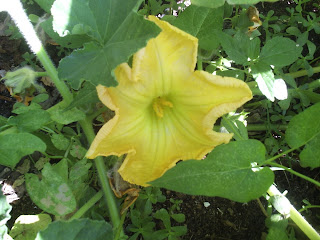
There are still some fruits without the brown spot on the celebrity and I think maybe it can be saved if I can figure out the right thing to add to the soil. It might not even be the nitrates at all because my bell pepper plant still looks good and my squash are blossoming nicely:

Now, I can also happily report on the status of my Green Zebra heirloom plant. It's growing large and covered in little stripey mini-watermelon-like (in appearance) tomatoes. I did notice that one had the spot on the bottom, but that could just be because it fruited early. I planted the Zebra in Matel's perennial bed which she informed me she never covered with pigeon poop...so really, it only goes to say...nitrates be damned--unless the soil is lacking them, do not add them. A Ph test is a good way to tell and I plan on getting over there tomorrow morning to do the neccessary leg work.
I really hope that my friend Justin (who orginally told me Green Zebras taste awful) is wrong because it's very possible that these little mutants are the only tomatoes I'll be eating from my garden this year.
On a different note (and oh man, forgive me if I sound preachy--it's unintentional), in the time since I last blogged I've spent a lot of time reading Barbara Kingsolvers Animal, Vegetable, Miracle - A Year of Food Life about her family's efforts to eat only locally produced (in almost all cases, on their small-very small farm in southern appalachia) food. It is a well-written, always interesting, funny take on farm life. I liked it so much and am so moved that I've decided I'm educated enough to eat meat now. My views have evolved so much over 13 years of vegetarianism I never would have thought I'd want to. That's not to say I'll start ordering steaks or getting the pepperoni pizza or anything like that. I plan on only eating "pasture-finished" meat (which probably won't include red meat anytime soon anyway--I don't think my enzymes could handle it). "Pasture-finished" is the difference between an animal that ranged freely it's entire life and subsisted on a diet of mostly grass and an animal that was raised on a CAFO (Confined Animal Feeding Operation). I guess it just comes down to me having a better understanding of where food comes from and really learning to respect that cycle not curse it.
"When you kill a beast, say to him in your heart:
By the same power that slays you, I too am slain, and I too shall be consumed.
For the law that delivers you into my hand shall deliver me into a mightier hand.
Your blood and my blood is naught but the sap that feeds the tree of heaven.'"
-Kahlil Gibran
It's just where I'm at right now. The book is really full of great gardening advice too (though nothing about blossom end rot!) and any gardener would enjoy it. I started reading another book on the subject, Jane Goodall's Harvest for Hope- A Guide to Mindful Eating which is already proving to be another well-written little trove of knowledge.
Okay, until next time.

